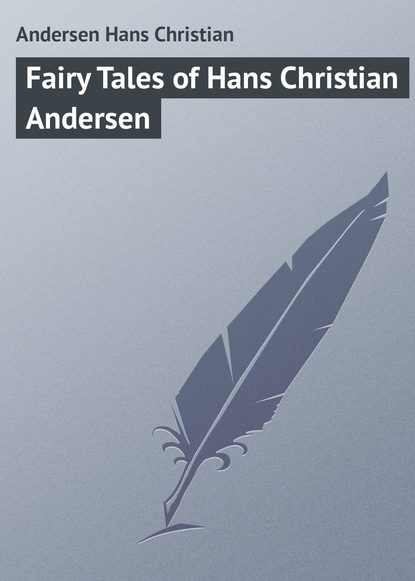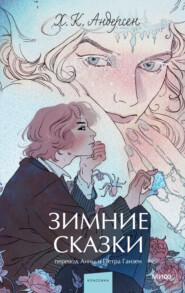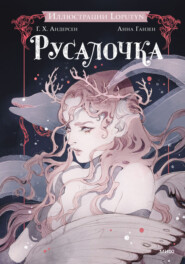По всем вопросам обращайтесь на: info@litportal.ru
(©) 2003-2024.
✖
Fairy Tales of Hans Christian Andersen
Настройки чтения
Размер шрифта
Высота строк
Поля
"I am not old," said the fir-tree, "there are many who are older than I am."
"Where do you come from? and what do you know?" asked the mice, who were full of curiosity. "Have you seen the most beautiful places in the world, and can you tell us all about them? and have you been in the storeroom, where cheeses lie on the shelf, and hams hang from the ceiling? One can run about on tallow candles there, and go in thin and come out fat."
"I know nothing of that place," said the fir-tree, "but I know the wood where the sun shines and the birds sing." And then the tree told the little mice all about its youth. They had never heard such an account in their lives; and after they had listened to it attentively, they said, "What a number of things you have seen? you must have been very happy."
"Happy!" exclaimed the fir-tree, and then as he reflected upon what he had been telling them, he said, "Ah, yes! after all those were happy days." But when he went on and related all about Christmas-eve, and how he had been dressed up with cakes and lights, the mice said, "How happy you must have been, you old fir-tree."
"I am not old at all," replied the tree, "I only came from the forest this winter, I am now checked in my growth."
"What splendid stories you can relate," said the little mice. And the next night four other mice came with them to hear what the tree had to tell. The more he talked the more he remembered, and then he thought to himself, "Those were happy days, but they may come again. Humpty Dumpty fell down stairs, and yet he married the princess; perhaps I may marry a princess too." And the fir-tree thought of the pretty little birch-tree that grew in the forest, which was to him a real beautiful princess.
"Who is Humpty Dumpty?" asked the little mice. And then the tree related the whole story; he could remember every single word, and the little mice was so delighted with it, that they were ready to jump to the top of the tree. The next night a great many more mice made their appearance, and on Sunday two rats came with them; but they said, it was not a pretty story at all, and the little mice were very sorry, for it made them also think less of it.
"Do you know only one story?" asked the rats.
"Only one," replied the fir-tree; "I heard it on the happiest evening of my life; but I did not know I was so happy at the time."
"We think it is a very miserable story," said the rats. "Don't you know any story about bacon, or tallow in the storeroom."
"No," replied the tree.
"Many thanks to you then," replied the rats, and they marched off.
The little mice also kept away after this, and the tree sighed, and said, "It was very pleasant when the merry little mice sat round me and listened while I talked. Now that is all passed too. However, I shall consider myself happy when some one comes to take me out of this place." But would this ever happen? Yes; one morning people came to clear out the garret, the boxes were packed away, and the tree was pulled out of the corner, and thrown roughly on the garret floor; then the servant dragged it out upon the staircase where the daylight shone. "Now life is beginning again," said the tree, rejoicing in the sunshine and fresh air. Then it was carried down stairs and taken into the courtyard so quickly, that it forgot to think of itself, and could only look about, there was so much to be seen. The court was close to a garden, where everything looked blooming. Fresh and fragrant roses hung over the little palings. The linden-trees were in blossom; while the swallows flew here and there, crying, "Twit, twit, twit, my mate is coming," – but it was not the fir-tree they meant. "Now I shall live," cried the tree, joyfully spreading out its branches; but alas! they were all withered and yellow, and it lay in a corner amongst weeds and nettles. The star of gold paper still stuck in the top of the tree and glittered in the sunshine. In the same courtyard two of the merry children were playing who had danced round the tree at Christmas, and had been so happy. The youngest saw the gilded star, and ran and pulled it off the tree. "Look what is sticking to the ugly old fir-tree," said the child, treading on the branches till they crackled under his boots. And the tree saw all the fresh bright flowers in the garden, and then looked at itself, and wished it had remained in the dark corner of the garret. It thought of its fresh youth in the forest, of the merry Christmas evening, and of the little mice who had listened to the story of "Humpty Dumpty." "Past! past!" said the old tree; "Oh, had I but enjoyed myself while I could have done so! but now it is too late." Then a lad came and chopped the tree into small pieces, till a large bundle lay in a heap on the ground. The pieces were placed in a fire under the copper, and they quickly blazed up brightly, while the tree sighed so deeply that each sigh was like a pistol-shot. Then the children, who were at play, came and seated themselves in front of the fire, and looked at it and cried, "Pop, pop." But at each "pop," which was a deep sigh, the tree was thinking of a summer day in the forest; and of Christmas evening, and of "Humpty Dumpty," the only story it had ever heard or knew how to relate, till at last it was consumed. The boys still played in the garden, and the youngest wore the golden star on his breast, with which the tree had been adorned during the happiest evening of its existence. Now all was past; the tree's life was past, and the story also, – for all stories must come to an end at last.
THE FLAX
The flax was in full bloom; it had pretty little blue flowers as delicate as the wings of a moth, or even more so. The sun shone, and the showers watered it; and this was just as good for the flax as it is for little children to be washed and then kissed by their mother. They look much prettier for it, and so did the flax.
"People say that I look exceedingly well," said the flax, "and that I am so fine and long that I shall make a beautiful piece of linen. How fortunate I am; it makes me so happy, it is such a pleasant thing to know that something can be made of me. How the sunshine cheers me, and how sweet and refreshing is the rain; my happiness overpowers me, no one in the world can feel happier than I am."
"Ah, yes, no doubt," said the fern, "but you do not know the world yet as well as I do, for my sticks are knotty;" and then it sung quite mournfully —
"Snip, snap, snurre,
Basse lurre:
The song is ended."
"No, it is not ended," said the flax. "To-morrow the sun will shine, or the rain descend. I feel that I am growing. I feel that I am in full blossom. I am the happiest of all creatures."
Well, one day some people came, who took hold of the flax, and pulled it up by the roots; this was painful; then it was laid in water as if they intended to drown it; and, after that, placed near a fire as if it were to be roasted; all this was very shocking. "We cannot expect to be happy always," said the flax; "by experiencing evil as well as good, we become wise." And certainly there was plenty of evil in store for the flax. It was steeped, and roasted, and broken, and combed; indeed, it scarcely knew what was done to it. At last it was put on the spinning wheel. "Whirr, whirr," went the wheel so quickly that the flax could not collect its thoughts. "Well, I have been very happy," he thought in the midst of his pain, "and must be contented with the past;" and contented he remained till he was put on the loom, and became a beautiful piece of white linen. All the flax, even to the last stalk, was used in making this one piece. "Well, this is quite wonderful; I could not have believed that I should be so favored by fortune. The fern was not wrong with its song of
'Snip, snap, snurre,
Basse lurre.'
But the song is not ended yet, I am sure; it is only just beginning. How wonderful it is, that after all I have suffered, I am made something of at last; I am the luckiest person in the world – so strong and fine; and how white, and what a length! This is something different to being a mere plant and bearing flowers. Then I had no attention, nor any water unless it rained; now, I am watched and taken care of. Every morning the maid turns me over, and I have a shower-bath from the watering-pot every evening. Yes, and the clergyman's wife noticed me, and said I was the best piece of linen in the whole parish. I cannot be happier than I am now."
After some time, the linen was taken into the house, placed under the scissors, and cut and torn into pieces, and then pricked with needles. This certainly was not pleasant; but at last it was made into twelve garments of that kind which people do not like to name, and yet everybody should wear one. "See, now, then," said the flax; "I have become something of importance. This was my destiny; it is quite a blessing. Now I shall be of some use in the world, as everyone ought to be; it is the only way to be happy. I am now divided into twelve pieces, and yet we are all one and the same in the whole dozen. It is most extraordinary good fortune."
Years passed away, and at last the linen was so worn it could scarcely hold together. "It must end very soon," said the pieces to each other; "we would gladly have held together a little longer, but it is useless to expect impossibilities." And at length they fell into rags and tatters, and thought it was all over with them, for they were torn to shreds, and steeped in water, and made into a pulp, and dried, and they knew not what besides, till all at once they found themselves beautiful white paper. "Well, now, this is a surprise; a glorious surprise too," said the paper. "I am now finer than ever, and I shall be written upon, and who can tell what fine things I may have written upon me. This is wonderful luck!" And sure enough the most beautiful stories and poetry were written upon it, and only once was there a blot, which was very fortunate. Then people heard the stories and poetry read, and it made them wiser and better; for all that was written had a good and sensible meaning, and a great blessing was contained in the words on this paper.
"I never imagined anything like this," said the paper, "when I was only a little blue flower, growing in the fields. How could I fancy that I should ever be the means of bringing knowledge and joy to man? I cannot understand it myself, and yet it is really so. Heaven knows that I have done nothing myself, but what I was obliged to do with my weak powers for my own preservation; and yet I have been promoted from one joy and honor to another. Each time I think that the song is ended; and then something higher and better begins for me. I suppose now I shall be sent on my travels about the world, so that people may read me. It cannot be otherwise; indeed, it is more than probable; for I have more splendid thoughts written upon me, than I had pretty flowers in olden times. I am happier than ever."
But the paper did not go on its travels; it was sent to the printer, and all the words written upon it were set up in type, to make a book, or rather, many hundreds of books; for so many more persons could derive pleasure and profit from a printed book, than from the written paper; and if the paper had been sent around the world, it would have been worn out before it had got half through its journey.
"This is certainly the wisest plan," said the written paper; "I really did not think of that. I shall remain at home, and be held in honor, like some old grandfather, as I really am to all these new books. They will do some good. I could not have wandered about as they do. Yet he who wrote all this has looked at me, as every word flowed from his pen upon my surface. I am the most honored of all."
Then the paper was tied in a bundle with other papers, and thrown into a tub that stood in the washhouse.
"After work, it is well to rest," said the paper, "and a very good opportunity to collect one's thoughts. Now I am able, for the first time, to think of my real condition; and to know one's self is true progress. What will be done with me now, I wonder? No doubt I shall still go forward. I have always progressed hitherto, as I know quite well."
Now it happened one day that all the paper in the tub was taken out, and laid on the hearth to be burnt. People said it could not be sold at the shop, to wrap up butter and sugar, because it had been written upon. The children in the house stood round the stove; for they wanted to see the paper burn, because it flamed up so prettily, and afterwards, among the ashes, so many red sparks could be seen running one after the other, here and there, as quick as the wind. They called it seeing the children come out of school, and the last spark was the schoolmaster. They often thought the last spark had come; and one would cry, "There goes the schoolmaster;" but the next moment another spark would appear, shining so beautifully. How they would like to know where the sparks all went to! Perhaps we shall find out some day, but we don't know now.
The whole bundle of paper had been placed on the fire, and was soon alight. "Ugh," cried the paper, as it burst into a bright flame; "ugh." It was certainly not very pleasant to be burning; but when the whole was wrapped in flames, the flames mounted up into the air, higher than the flax had ever been able to raise its little blue flower, and they glistened as the white linen never could have glistened. All the written letters became quite red in a moment, and all the words and thoughts turned to fire.
"Now I am mounting straight up to the sun," said a voice in the flames; and it was as if a thousand voices echoed the words; and the flames darted up through the chimney, and went out at the top. Then a number of tiny beings, as many in number as the flowers on the flax had been, and invisible to mortal eyes, floated above them. They were even lighter and more delicate than the flowers from which they were born; and as the flames were extinguished, and nothing remained of the paper but black ashes, these little beings danced upon it; and whenever they touched it, bright red sparks appeared.
"The children are all out of school, and the schoolmaster was the last of all," said the children. It was good fun, and they sang over the dead ashes, —
"Snip, snap, snurre,
Basse lure:
The song is ended."
But the little invisible beings said, "The song is never ended; the most beautiful is yet to come."
But the children could neither hear nor understand this, nor should they; for children must not know everything.
THE FLYING TRUNK
There was once a merchant who was so rich that he could have paved the whole street with gold, and would even then have had enough for a small alley. But he did not do so; he knew the value of money better than to use it in this way. So clever was he, that every shilling he put out brought him a crown; and so he continued till he died. His son inherited his wealth, and he lived a merry life with it; he went to a masquerade every night, made kites out of five pound notes, and threw pieces of gold into the sea instead of stones, making ducks and drakes of them. In this manner he soon lost all his money. At last he had nothing left but a pair of slippers, an old dressing-gown, and four shillings. And now all his friends deserted him, they could not walk with him in the streets; but one of them, who was very good-natured, sent him an old trunk with this message, "Pack up!" "Yes," he said, "it is all very well to say 'pack up,'" but he had nothing left to pack up, therefore he seated himself in the trunk. It was a very wonderful trunk; no sooner did any one press on the lock than the trunk could fly. He shut the lid and pressed the lock, when away flew the trunk up the chimney with the merchant's son in it, right up into the clouds. Whenever the bottom of the trunk cracked, he was in a great fright, for if the trunk fell to pieces he would have made a tremendous somerset over the trees. However, he got safely in his trunk to the land of Turkey. He hid the trunk in the wood under some dry leaves, and then went into the town: he could so this very well, for the Turks always go about dressed in dressing-gowns and slippers, as he was himself. He happened to meet a nurse with a little child. "I say, you Turkish nurse," cried he, "what castle is that near the town, with the windows placed so high?"
"The king's daughter lives there," she replied; "it has been prophesied that she will be very unhappy about a lover, and therefore no one is allowed to visit her, unless the king and queen are present."
"Thank you," said the merchant's son. So he went back to the wood, seated himself in his trunk, flew up to the roof of the castle, and crept through the window into the princess's room. She lay on the sofa asleep, and she was so beautiful that the merchant's son could not help kissing her. Then she awoke, and was very much frightened; but he told her he was a Turkish angel, who had come down through the air to see her, which pleased her very much. He sat down by her side and talked to her: he said her eyes were like beautiful dark lakes, in which the thoughts swam about like little mermaids, and he told her that her forehead was a snowy mountain, which contained splendid halls full of pictures. And then he related to her about the stork who brings the beautiful children from the rivers. These were delightful stories; and when he asked the princess if she would marry him, she consented immediately.
"But you must come on Saturday," she said; "for then the king and queen will take tea with me. They will be very proud when they find that I am going to marry a Turkish angel; but you must think of some very pretty stories to tell them, for my parents like to hear stories better than anything. My mother prefers one that is deep and moral; but my father likes something funny, to make him laugh."
"Very well," he replied; "I shall bring you no other marriage portion than a story," and so they parted. But the princess gave him a sword which was studded with gold coins, and these he could use.
Then he flew away to the town and bought a new dressing-gown, and afterwards returned to the wood, where he composed a story, so as to be ready for Saturday, which was no easy matter. It was ready however by Saturday, when he went to see the princess. The king, and queen, and the whole court, were at tea with the princess; and he was received with great politeness.
"Will you tell us a story?" said the queen, – "one that is instructive and full of deep learning."
"Yes, but with something in it to laugh at," said the king.
"Certainly," he replied, and commenced at once, asking them to listen attentively. "There was once a bundle of matches that were exceedingly proud of their high descent. Their genealogical tree, that is, a large pine-tree from which they had been cut, was at one time a large, old tree in the wood. The matches now lay between a tinder-box and an old iron saucepan, and were talking about their youthful days. 'Ah! then we grew on the green boughs, and were as green as they; every morning and evening we were fed with diamond drops of dew. Whenever the sun shone, we felt his warm rays, and the little birds would relate stories to us as they sung. We knew that we were rich, for the other trees only wore their green dress in summer, but our family were able to array themselves in green, summer and winter. But the wood-cutter came, like a great revolution, and our family fell under the axe. The head of the house obtained a situation as mainmast in a very fine ship, and can sail round the world when he will. The other branches of the family were taken to different places, and our office now is to kindle a light for common people. This is how such high-born people as we came to be in a kitchen.'
"'Mine has been a very different fate,' said the iron pot, which stood by the matches; 'from my first entrance into the world I have been used to cooking and scouring. I am the first in this house, when anything solid or useful is required. My only pleasure is to be made clean and shining after dinner, and to sit in my place and have a little sensible conversation with my neighbors. All of us, excepting the water-bucket, which is sometimes taken into the courtyard, live here together within these four walls. We get our news from the market-basket, but he sometimes tells us very unpleasant things about the people and the government. Yes, and one day an old pot was so alarmed, that he fell down and was broken to pieces. He was a liberal, I can tell you.'

















